Every Good Friday, if you happen to have Antiguans and Barbudans in your social media feed, you may realize there’s a debate that becomes something of a ritual – let’s call it the Great Ducana Debate. It’s a debate in which fans of this traditional Antiguan and Barbudan Good Friday meal (i.e. ducana with saltfish and cassi or chop-up) must declare their hand – raisins vs. no raisins.
Apparently ducana is not ducana without it.
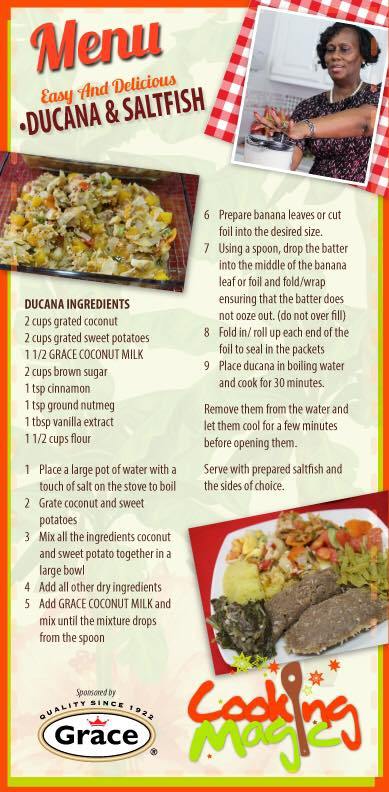
(Cooking Magic – Antigua and Barbuda and the Eastern Caribbean’s longest running television show – posted this recipe to its facebook page and…yep, no raisins.)
I’m Team No Raisins because I don’t eat raisins and I didn’t grow up seeing ducana with raisins. But, really, I’m Team No Ducana. Nope, it’s not for me. I’ve never loved it the way your typical Antiguan does. Yet to diss it in any way, shape, or form is sacrilegious.. Good Friday level sacrilegious. The love of ducana in Antigua is so deep, my meh-ness on the coconut-sweet-potato-grated-floured-nutmegged-cinnamoned-and-boiled-in-a-fig-leaf concoction could prompt some to exile me to Antigua’s uninhabited sister-island, Redonda. I mean, they could try.
The Great Ducana Debate though always leaves me reflecting on how embedded food is in our island culture – as much as dress, music, language, values, history, and mythology are a reflection of who we are and what made us. As an island author, I use food in my books and stories in this way. And so, in tribute to The Great Ducana Debate, I thought I’d share some of the times food showed up in my own island stories and/or books.
Food as Comfort
“So, when the kettle whistled, they drank their tea and she set him on the couch for some rest and she retreated to her room to pray and think. Come morning, before even cock crow, she was up and got him up for a shower and the hard work of helping her lug the boxes out to the corner where dogs and people would have ample time to pick through them before the trash men came on Tuesday. She fed him saltfish and chop-up for breakfast and they still made it to church on time. She could tell he hadn’t been in a while the way he fidgeted in her late husband’s old clothes and scratched at himself all through mass. She almost expected him to bolt when finally Father George set them free. But he stuck to her side on the way home and throughout the day as she cooked a dinner of potato salad, macaroni pie and goat meat. “
– excerpt from my fictional story Teacher May, published in Poui (Number Xll, 2011) and Dancing Nude in the Moonlight: 10th Anniversary Edition and Other Writings (published 2014).
In this scene, after trying to understand how a former student had fallen so far in life he had attempted to rob her, Teacher May gives him tea (if I could go back and edit it, I’d make it bush tea, specifically soursop bush tea like my Tanty used to serve at night to put us kids to sleep and stuff under her head-tie to ease whatever pain she bore).
“The piece of fudge her father slipped her wasn’t enough to make her forget that feeling but it was enough to distract her from it for a time. Brenda didn’t have much of a sweet tooth, wasn’t one for suckabubbies and sugar cakes, but she did love fudge, the way it was slightly sandy textured but melted on the tongue, almost too sweet, but, no, just enough.”
– excerpt from my fictional story Breaking with Tradition, published in Round My Christmas (2014).
In it, the main character’s sister is outgrowing her and, seeing how it hurts, her father tries to comfort her with the homemade-and-sold-by-street-vendors sweets, in this case the pale brown squares of sweetness made of sugar, milk, sometimes peanut and… more sugar?
Food for limin’
“He had once been the adventurous Captain of their little seaside village; braving storm, hauling fish pots and telling the best at-sea fables while roasting fish over a grill made from a steel drum in the ‘Shack’s’ backyard, under a blanket of stars.
As a child, Rita had sat on the sand, breathing the smoke and sweet aroma, face turned to the stars, wishing for romance and adventure of her own.”
– excerpt from my fictional story At Sea, published in Munyori (2011) and Dancing Nude in the Moonlight: 10th Anniversary Edition and Other Writings (published 2014).
This references the practice of fried and roast fish as street food (other cooked food street food favourites include goat water, rice pudding (what some other cultures call blood pudding), jerk-or-barbeque chicken, and souse) particularly on weekends.
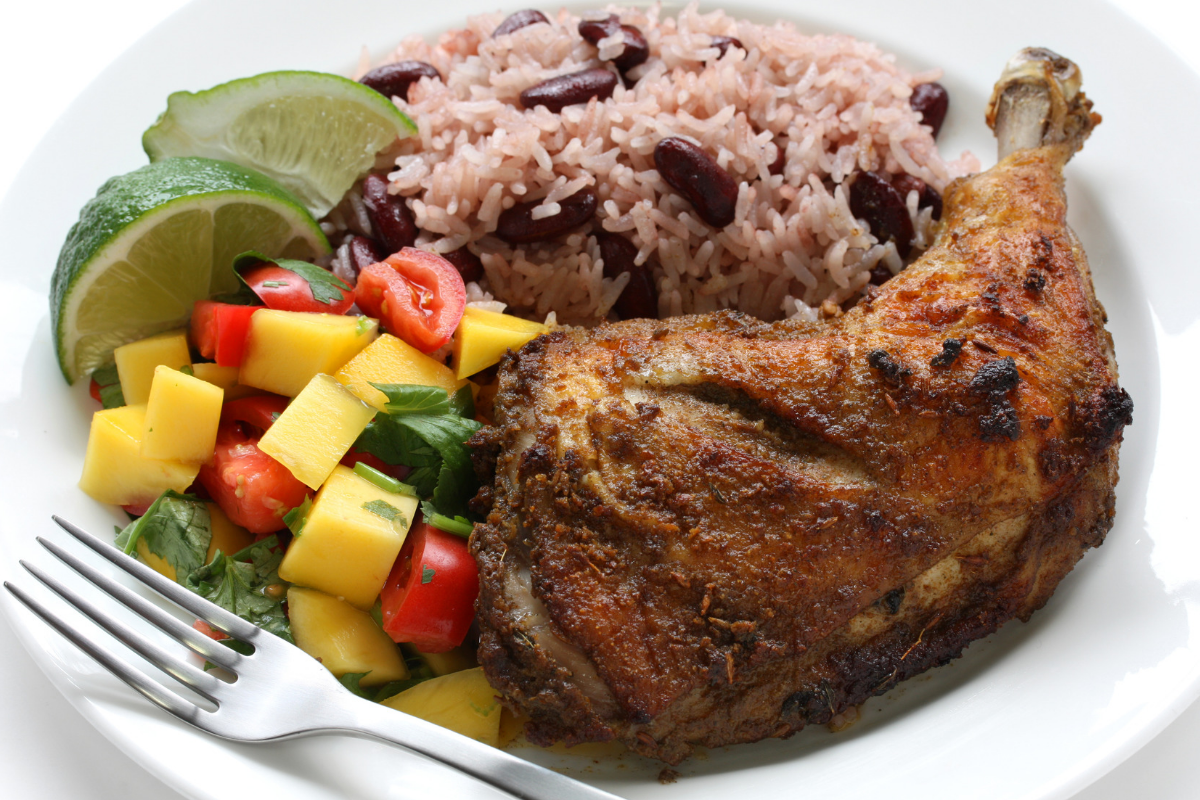
“He was ex-U.S. Army, had eyes in the back of his head; or so the boys gossiped among themselves. He’d heard them, and knew this was one of the reasons they didn’t rob Sister Brown’s Shoppe or Moses’ haul from the Fish Fry which they huddled around every Friday.
He didn’t fool himself that it was his company that drew them; knew it was the random scraps of fish and cassava bread which they devoured like the neighbourhood’s stray cats devoured the fish guts. But then, that’s just what all those boys were, strays; not one of them sure of his place in the world.”
– excerpt from my fictional story Friday Night Fish Fry, published in Sea Breeze (2008) and in Dancing Nude in the Moonlight: 10th Anniversary Edition and Other Writings (published 2014).
It illustrates the way the street-food-set up becomes a meeting place, giving some a sense of community.
Food to mark the seasons
“She might venture out then; sit under the mango tree in the backyard. As she was now, watching a bird – maybe the usual one, maybe another – peck eagerly at the pregnant orange-coloured flesh. It ate a hole through the fullest side of the mango, only to dash off to begin anew on another. The mangoes were plentiful this summer in spite of the rain’s usual stinginess; only they were mostly half-rotted and hollowed out thanks to the birds’ industriousness. Glory couldn’t bring herself to care.”
– excerpt from my fictional story After Glow, published on Tongues of the Ocean (2009), in So the Nailhead Bend, So the Story End (2012), and in Dancing Nude in the Moonlight: 10th Anniversary Edition and Other Writings (published 2014).
It’s perhaps the darkest mango tale I’ve ever written. Usually, mangoes are sweetness and summer.
In fact, the mango is my favourite fruit, so, of course, when I wrote my children’s book, With Grace (2016), I built the whole story around the mango:
“Unlike the rest of the island, the mangoes at Grace’s Peak don’t bloom only in the summer. Their tantalizing fragrance is a year round perfume, the trees budding at Grace’s will, the juicy fruit plopping into her open palm as she desires, its orange-gold sweetness adorning her breakfast plate each morning.”
There’s even a mango faerie who “…looks like nothing more than a mango blossom.”
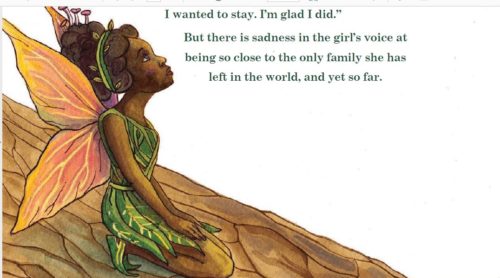
Food to reflect differences
‘“I can help with snacks,” the woman was saying. “Finger foods for during rehearsals and performance night.”
The woman seemed almost shy. Was that Granny Linda? He’d pictured someone taller. Her voice had sort of a shake in it too.
This was Zahara’s no non-sense, ‘take no bullshit’ grandmother? Wow.
“Maybe some grilled pork and pineapple skew-ers?” she added.
“That sounds good,” Mr. Perry said, nodding. “Although you know, some of the kids are vegetarian; pork might not do for everyone.”
“That’s okay, I can substitute chicken,” Granny Linda said, and at that everyone fell out laughing.’
– from Musical Youth (2014).
It reflects a Caribbean where vegetarianism hasn’t quite caught on, generationally at least, ital living and eating being primarily associated with Rasta. I enjoyed coming up with food for Granny Linda to contribute to the food station at the teens’ rehearsals and performance night.
Food in all its gendered problematicness
“The smile that stretched her face felt more like a grimace, but he seemed satisfied with it. Celia set the food in front of him and they sat on opposite sides of the table watching him eat. Celia had that look of pride on her face – or was it fulfillment – that she had seen women like her mother get whenever someone – in particular, a man – was enjoying a meal she’d prepared.”
– excerpt from Dancing Nude in the Moonlight (2004, 2014), a scene very much reflective of a Caribbean in which (some) girls are still chided that if they can’t cook, they won’t be able to hold a man.
Food for good times
“And Tanty showed improvement. By early November, she was even getting out of bed some days. It was good to see her up and about again.
One day, she and June even made sugar cakes and the house was thick with the smell. And when he sneaked in through the back door to steal one of the cakes hardening on the kitchen counter, and Tanty sang out, ‘I see you, you know,’ it felt like old times.”
– excerpt from The Boy from Willow Bend (2003, 2009), in which for a window of time the smell of grated coconut and reduced brown sugar smelled like hope.
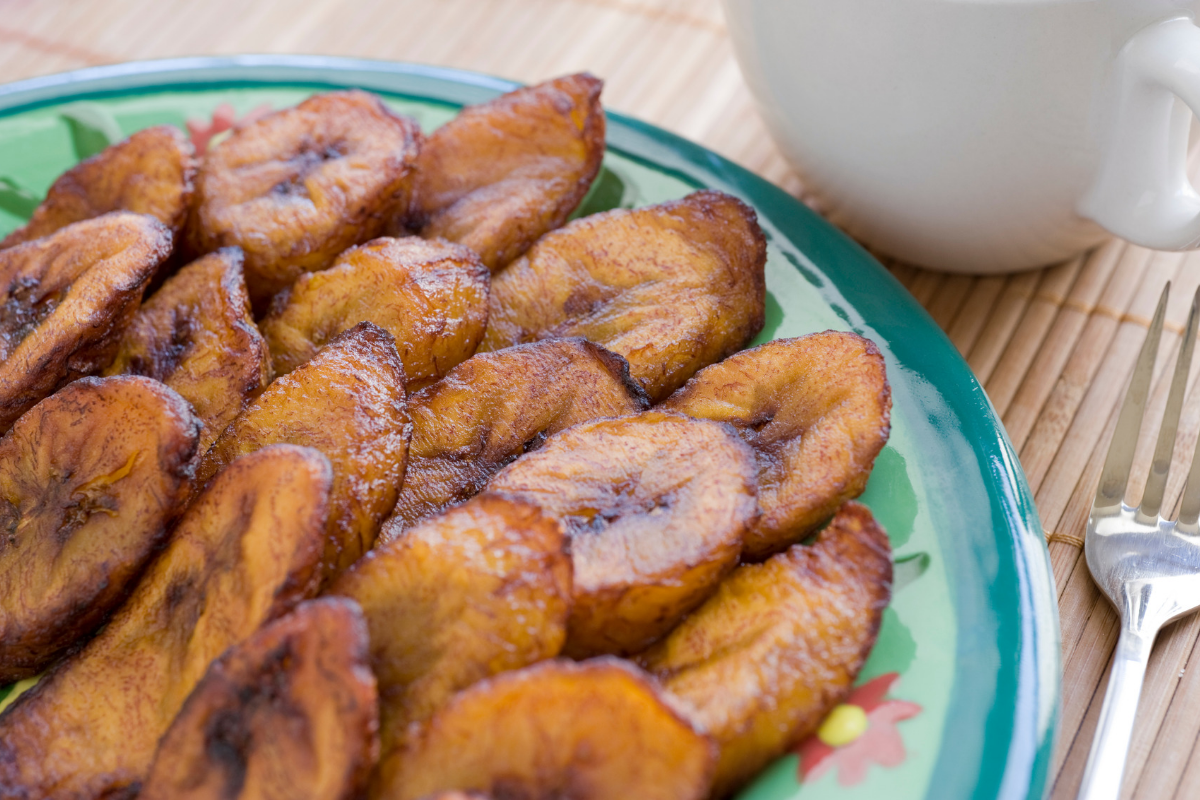
Cooking lessons
“When she was done chopping the vegetables, about midnight, Audrey told her to set them to boil in one of the huge pots under the cupboard, twin to the one already on the stove with the “meatkin’.”
“No, no, no,” Audrey called out as she moved to dump the mountains of vegetables into the pot.
“What?”
“The ‘troba and pawpaw can’t go in the cold water so,” Audrey said, coming over. “Dem will boil hard.”
Nikki raised her eyebrows at that.
Audrey took over the task, explaining as she went. “You ha fu mek the water boil up first. Plenty people that call themself cook always mek that mistake an’ you eat them ‘troba, e tough tough. You wait til e boil up, then put um in. You put any salt?”
“No, I didn’t know how much…”
“Is to your taste,” Audrey said. “Pass it here.” And Nikki did.
Jazz laughed. “That reminds me so much of my mother. ‘Mom, how much of this, how much of that?’ To give it some flavour, she’d say. And I’d be no clearer.”
“Is so my mammy did stay, too,” Carlene said. “‘You wan’ learn, come watch,’ she’d say. ‘Don’ ask me nutten.’”
Laughter filled the crowded kitchen. “Hey, Nikki,” Jazz said, “You should get Fanso to publish a cook book. Put down some particulars.”
“Please, cook book!” Audrey scoffed. “The knowing in the doing.”’
– excerpt from Oh Gad! (2012, 2014).
In many ways Audrey here is my mother – who I got to give me her recipe for making pepperpot, reluctantly, because like Audrey she swears by the philosophy that “the knowing in the doing.” There is a lot of cooking in Oh Gad!; after all, one of the main secondary characters is a chef who likes to experiment, but the scene of the women cooking up pepperpot (greens and pickled meats chopped up into the thickest and tastiest soup you’ll ever have) in the overheated kitchen for the CARICOM Day picnic was an essentially Antiguan moment and so there was no other choice.
Pepperpot is my favourite Antiguan-Barbudan food – so, The Great Ducana Debate and its raisins vs. no raisins “controversy” aside, nobody better come for my Antigua-Barbuda card.
An earlier version of Food as Culture appeared on my blog – Jhohadli I’ve grown to like ducana a bit more since writing it. Still #teamnoraisins though.

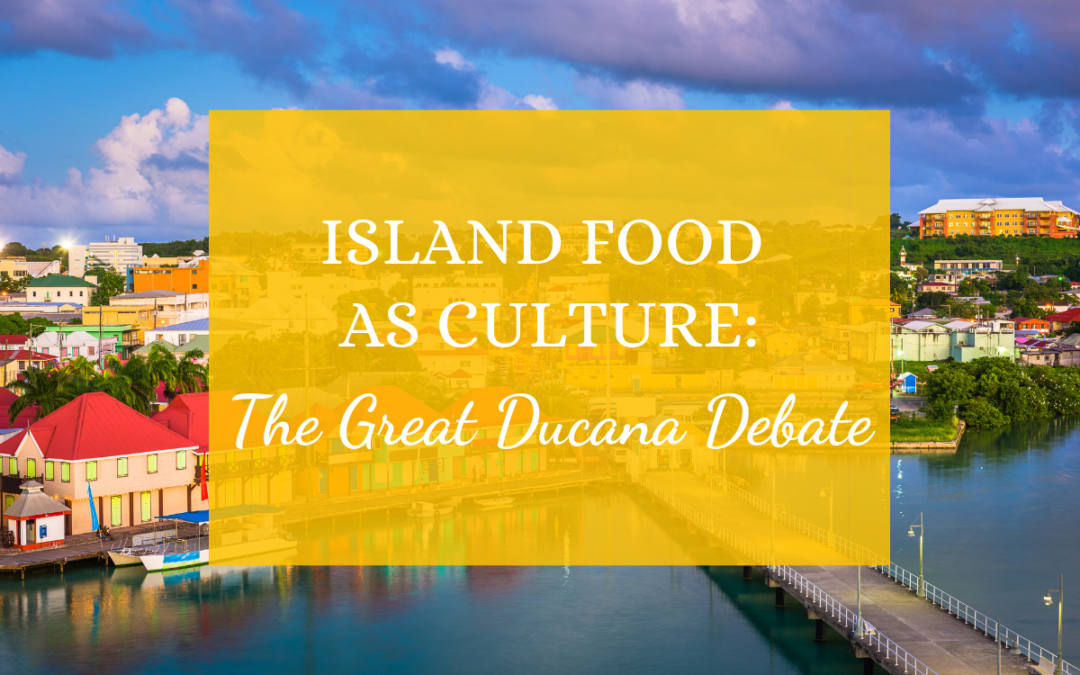
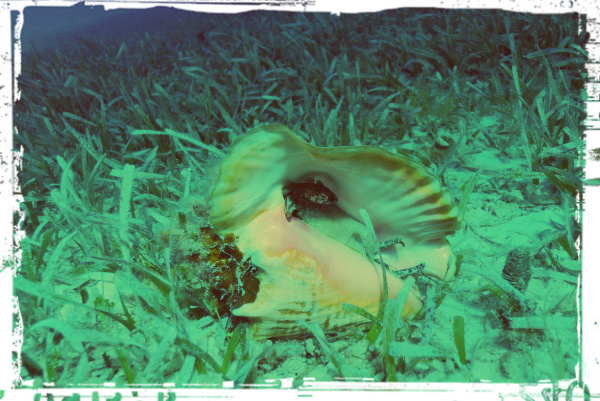
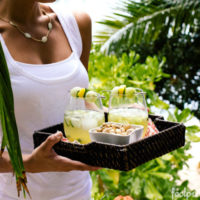
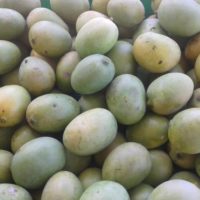










1 Comment